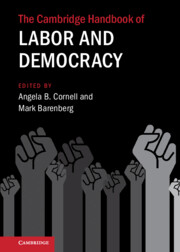Book contents
- The Cambridge Handbook of Labor and Democracy
- The Cambridge Handbook of Labor and Democracy
- Copyright page
- Contents
- Contributors
- Acknowledgments
- Introduction
- Part I Labor and Democracy: Theory and Practice
- Part II History, Politics, and Law
- 5 Sectoral Bargaining in the United States
- 6 The Lever and the Fulcrum
- 7 “Industrial Democracy” in the United States, Past and Present
- 8 Holding On
- 9 Unions and the Democratic First Amendment
- Part III Labor, Diversity, and Democracy
- Part IV Country and Regional Perspectives
- Part V Labor and Democracy Sectoral Case Studies: Platform Workers, Higher Education, and the Care Industry
- Index
- References
5 - Sectoral Bargaining in the United States
Historical Roots of a Twenty-First Century Renewal
from Part II - History, Politics, and Law
Published online by Cambridge University Press: 25 January 2022
- The Cambridge Handbook of Labor and Democracy
- The Cambridge Handbook of Labor and Democracy
- Copyright page
- Contents
- Contributors
- Acknowledgments
- Introduction
- Part I Labor and Democracy: Theory and Practice
- Part II History, Politics, and Law
- 5 Sectoral Bargaining in the United States
- 6 The Lever and the Fulcrum
- 7 “Industrial Democracy” in the United States, Past and Present
- 8 Holding On
- 9 Unions and the Democratic First Amendment
- Part III Labor, Diversity, and Democracy
- Part IV Country and Regional Perspectives
- Part V Labor and Democracy Sectoral Case Studies: Platform Workers, Higher Education, and the Care Industry
- Index
- References
Summary
Because of the virtual demise of firm centered collective bargaining, many labor partisans have rediscovered a form of wage determination originating in the Progressive Era. Sectoral bargaining encompasses an effort to win better conditions in an entire occupation or industry. Instead of a collective bargaining contract, standard-setting laws or codes are enacted, either by the legislature or a state board that sets wages and working conditions once all the stakeholders have had their say. Just as civil rights laws apply to all US workplaces regardless of the attitude of workers or employers, so too would a wage board promulgate a set of work standards that are equally universal, at least within the industry and region over which the board has jurisdiction.
- Type
- Chapter
- Information
- The Cambridge Handbook of Labor and Democracy , pp. 87 - 101Publisher: Cambridge University PressPrint publication year: 2022

